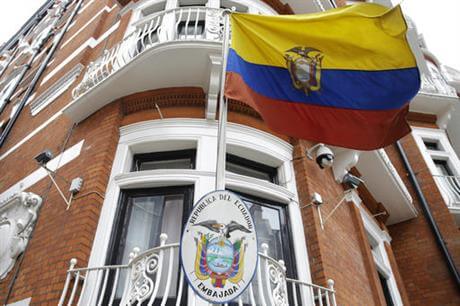
By RAPHAEL SATTER
Midway through releasing a series of damaging disclosures about U.S. presidential contender Hillary Clinton, WikiLeaks founder Julian Assange says his hosts at the Ecuadorean Embassy in London abruptly cut him off from the internet. The news adds another layer of intrigue to an extraordinary campaign.
“We can confirm Ecuador cut off Assange’s internet access Saturday, 5pm GMT, shortly after publication of Clinton’s Goldman Sachs (speeches),” the group said in a message posted to Twitter late Monday.
With both WikiLeaks and Ecuadorean officials refusing to say much more about the incident, outsiders were left to guess at what was happening behind closed doors at the embassy suite at No. 3 Hans Crescent, a stucco-fronted building which Assange has called home for more than four years. Had Ecuadorean diplomats lost patience with their famous Australian houseguest? Had they finally bowed to pressure from Washington to muzzle the outspoken ex-hacker following one revelation too many? Had there been some other kind of confrontation?
WikiLeaks said unspecified “contingency plans” were in place and its Twitter account was still active Tuesday. On Monday it released the latest tranche of emails from senior Clinton ally John Podesta, suggesting that, for now at least, the group’s ability to publish has not been compromised. The disclosure was the 10th installation in a series of leaks which have captured the workings of Clinton’s inner circle and included excerpts of her well-compensated speeches to investment bank Goldman Sachs.
by TaboolaMore from AP
Broadway concert for Hillary Clinton draws huge stars
Emails show Clinton treading lightly with Wall Street talks
WikiLeaks staffers Kristinn Hrafnsson and Sarah Harrison did not return repeated messages seeking comment. A woman who answered the phone at the embassy said she was not authorized to say anything. Ecuador’s Foreign Minister Guillaume Long, approached by The Associated Press on the sidelines of a United Nations conference in Quito on Monday, declined to comment when asked about Assange. His office later released a terse statement in response to “the speculation of the last few hours” reaffirming Assange’s asylum status and saying that “his protection by the Ecuadorean state will continue while the circumstances that led to the granting of asylum remain.”
The statement made no mention of Assange’s internet access.
Assange fled to the Ecuadorean Embassy on June 19, 2012, after a drawn-out and ultimately unsuccessful legal battle to avoid extradition to Sweden, where he remains wanted over an allegation of rape. British authorities have made clear they would arrest him if he tried to leave, and London’s Metropolitan Police used to maintain a visible presence outside the building.
Assange has carved out a life at Hans Crescent, dining on delivered food, welcoming famous well-wishers and even occasionally addressing the media the embassy’s balcony. But evidence of tension and mutual suspicion with his hosts surfaced after BuzzFeed News drew on confidential Ecuadorean government documents to detail a violent, after-hours confrontation between Assange and an Ecuadorean security guard in September 2012.
The documents also carried a warning that Assange’s “evident anger” and “feelings of superiority” could cause stress to those around him — “especially the personnel who work in the embassy, mainly women.”
___
Associated Press Writer Gonzalo Solano contributed reporting from Quito, Ecuador.
Discuss this story on Twitter or Facebook



